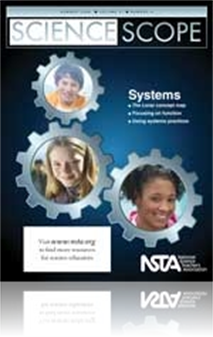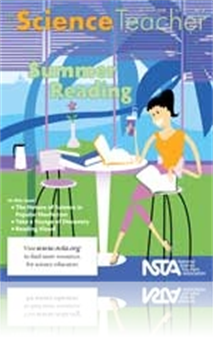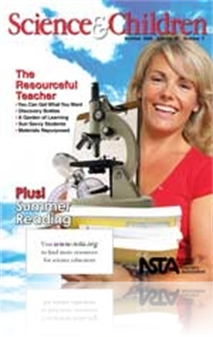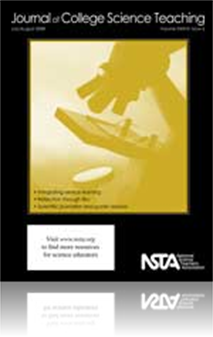All Resources
Journal Article
In several previous Issues In-Depth columns, science topics deeply affected by population size—such as climate change, fuel and agricultural resources, and ecology—have been discussed. In this column, the authors discuss the issue of population g...
Journal Article
On December 27, 1831, the H.M.S. Beagle left Plymouth Harbor for a round-the-world voyage. On board was would-be botanist Charles Darwin, the best tour guide biology has ever known. In 2009, we will celebrate Darwin’s 200th birthday and the 150th a...
Journal Article
In this final “Ask the Experts” column, our own resident “expert” and Department Editor, Marc Rosner, addresses the following questions: • Why is chocolate bad for dogs? • Where does the color go when paper fades after sun exposure?...
Journal Article
Editor’s Roundtable: Systems—A powerful interdisciplinary theme
A systems approach to science education is one of the powerful interdisciplinary ideas that AAAS recommends be woven through science learning at all levels and in all content areas. AAAS also calls for making systems thinking explicit in middle schoo...
Journal Article
Scope on the Skies: Dance of the planets and our Moon
This summer, the visible planets will put on quite a display, giving us not only the opportunity to compare relative orbital motions, but to also see some beautiful arrangements and conjunctions among the planets, stars, and our Moon. Some of the cel...
Journal Article
Structuring the Level of Inquiry in Your Classroom
As the upcoming school year approaches, many science teachers may be looking for new ways to incorporate inquiry in their classrooms. Fortunately, teachers have an array of inquiry activities at their fingertips. But with so many resources available,...
Journal Article
After the Bell: Developing Sun Sense—Learning about protection from the Sun’s rays
The American Academy of Dermatology (2008) reports that our students will experience 80% of their lifetime exposure to the Sun by the time they are 18. Further, research has demonstrated that continued exposure to the Sun’s ultraviolet rays can lea...
Journal Article
Discover discovery bottles! These wide-mouth plastic containers of any size filled with objects of different kinds can be terrific tools for science explorations and a great way to cultivate science minds in a K—2 science classroom. In addition, th...
Journal Article
Summer is a time for personal enrichment for teachers. Many travel, take formal classes, or work as interns or volunteers in scientific endeavors. But whatever the schedule, it’s also a time for teachers to get back to basics. Instead of being forc...
Journal Article
Idea Bank: Measuring the Speed of Sound
The following physics lab activities are new versions of old experiments for measuring the speed of sound—what makes them new is their use of electronic interfacing, which can be exciting for students. Each activity addresses the National Science E...
Journal Article
Point of View: The Conversion of Charles
This essay tells the story of the path taken by a veteran physics teacher with a strongly traditional, didactic style of teaching to a more constructivist, inquiry-based, student-centered pedagogy. It highlights the importance of the time needed for ...
Journal Article
Every Day Science Calendar: July 2008
This monthly feature contains facts and challenges for the science explorer. ...
Journal Article
Science Sampler: Conservation of mass and an unsuspected buoyancy effect
Over the years, many interesting chemical reactions and activities have been used to illustrate the conservation of mass. The reaction of baking soda and vinegar is a common example. The experimental procedure described in this article presents a spe...
Journal Article
The National Science Education Standards encourage teachers to go on their own special path to professional development. Whether your budget and personal schedule allow real travel or vicarious adventure, summer is a great time to take a book along. ...
Journal Article
The Early Years: An Invertebrate Garden
For farmers and gardeners, slugs and snails may be serious pests that will limit the amount of harvest, but for a child, they represent a world to be explored. To teachers, however, invertebrates are tools for broadening students’ understanding abo...
Journal Article
Farm to Table and Beyond: Helping Students Make Sense of the Global Food System
It is not enough for students to acquire knowledge about how food is produced and processed; they must also come to understand the biological and environmental contexts in which food production, processing, and transportation take place. Through diag...
Journal Article
Innovative Assessment Tools for a Short, Fast-Paced, Summer Field Course
An experiential science program, such as a summer course at a field station, requires unique assessment tools. Traditional assessment via a pencil-and-paper exam cannot capture the essential skills and concepts learned at a summer field station. Ther...
Journal Article
In order to beautify the school environment and further student learning, fourth-graders cultivated a Native Plant Learning Garden. They were responsible for designing a layout, researching garden elements, preparing the area, and planting a variety ...
Journal Article
Case Study: Ethanol or Biodiesel? A Systems-Analysis Decision
This case study stresses the need to broadly consider an entire system, including all of the energy inputs and outputs involved, to determine the real efficiency of that system. It also asks its student audience to consider the role that scientific i...
Journal Article
Schools in the United States are faced with an increasingly diverse student population and a dramatic increase in the number of English language learners (ELLs) in all grades. As such diverse populations grow in this era of high-stakes testing and ac...
Journal Article
Favorite Demonstration: A Simple Model of Hox Genes—Bone Morphology Demonstration
Visual demonstrations of abstract scientific concepts are effective strategies for enhancing content retention (Shmaefsky 2004). The concepts associated with gene regulation of growth and development are particularly complex and are well suited for t...
Journal Article
Methods and Strategies: Using Drawing Strategically
Drawing activities in science can help students conceptualize and reflect on their experiences. In this article, the authors share their experiences incorporating drawing into science lessons for third- and fourth-grade students. While these examples...
Journal Article
Science Shorts: Project BudBurst—Analyzing Data
Project BudBurst is a national program intended to get students and other “citizen scientists” to participate in a real study about plants, the environment, and climate change. It also provides an excellent opportunity for students to build data-...
Journal Article
Tried and True: Rock cycle project—Rock and rap CD cover
The Earth system views the entire planet as a single dynamic entity. Understanding the individual components and their interactions is necessary to completely understand how the planet works. Because the Earth system can be too complex for many middl...






